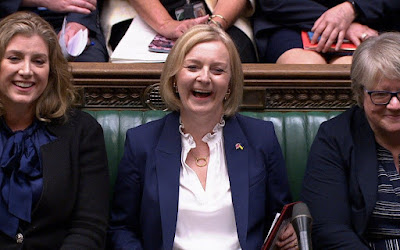My mother said I shouldn’t write about politics, for fear of attracting the wrong kind of attention. But what if politics is all anyone is talking about, again, because it is all we are given to talk about, again?
The extremely short version of the last week is this: Liz Truss, the fourth Prime Minister since this website began in May 2016, resigned on Thursday 20th October, having only become leader on Tuesday 6th September. In that time, her free-market, low-tax, high-growth economic policy was trashed both by the world markets, leading to higher interest rates, a weaker Pound and higher government borrowing costs, and by the replacement Chancellor of the Exchequer appointed by Truss, the rejection of her policy making her position untenable.
I had already decided I had written enough about Liz Truss by the time she became Prime Minister, like that matters much now: when she mischaracterised postmodernist philosophy as having no space for evidence [link]; when that speech began my own series on postmodernism’s continued relevance [link], how another speech railed against “ludicrous debates about language, statues and pronouns” [link]; and questioning what the “post-Elizabethan age” will be under King Charles III and a Prime Minister Truss [link].I am tired of being told we are living in unprecedented times. Boris Johnson was still Prime Minister as late as July, when anxiety already running high over the cost of living and energy prices, but the Conservative Party since then appear to have expended more energy on keeping itself together. Even if the current week-long leadership contest is a recognition that two months was too long for the last one, especially when it didn’t produce a satisfactory result, the course of events are still up in the air: either one person gets more than one hundred MPs supporting them to be a candidate by 14:00 on Monday 24th October, making them Prime minister immediately, or we could have as many as three candidates, who then need to be voted on by the same Party members that elected Liz Truss.
This doesn’t reduce the outrage at having to go through the process again. In order just to follow the news, which feels like it is changing with every moment, you are reduced to the “doomscrolling” of live news feeds reporting every event as it breaks, watching the government being contradicted in real time on Thursday 21st October: everything is fine; Truss has called a meeting; no speech is planned; they’ve got the lectern out....
I had already reduced the amount of news I watch on television by the time Boris Johnson resigned as Prime minister in July 2022, although that was easy in the week of this event as my TV had broken [link], but the continued rumbling of unease about, well, the national situation, has not subsided despite trying not to take as much notice of it. I don’t know how long it can go on, or when it will end.The Conservative Party assume they can keep thinking they can fix their own mistakes, and Boris Johnson, having flown back from his third holiday since being thrown out, appears to think his old job is his for the taking again, without acknowledging that he is Boris Johnson, and that name comes with baggage.
Even as I write, I am sure this won’t be the end of it. We can’t guarantee at this point that whoever is elected as the next Prime Minister can hold their party together, only because that questions was not answered by the last PM.
My objections to the Conservative Party right now are moral, not ideological, resulting from the situation they have created. These people are not my betters, and they do not command my respect. This isn’t even about wanting another party in charge, this is just about wanting stability, and if they cannot do that, then they need to give the people the chance to decide who can.


No comments:
Post a Comment